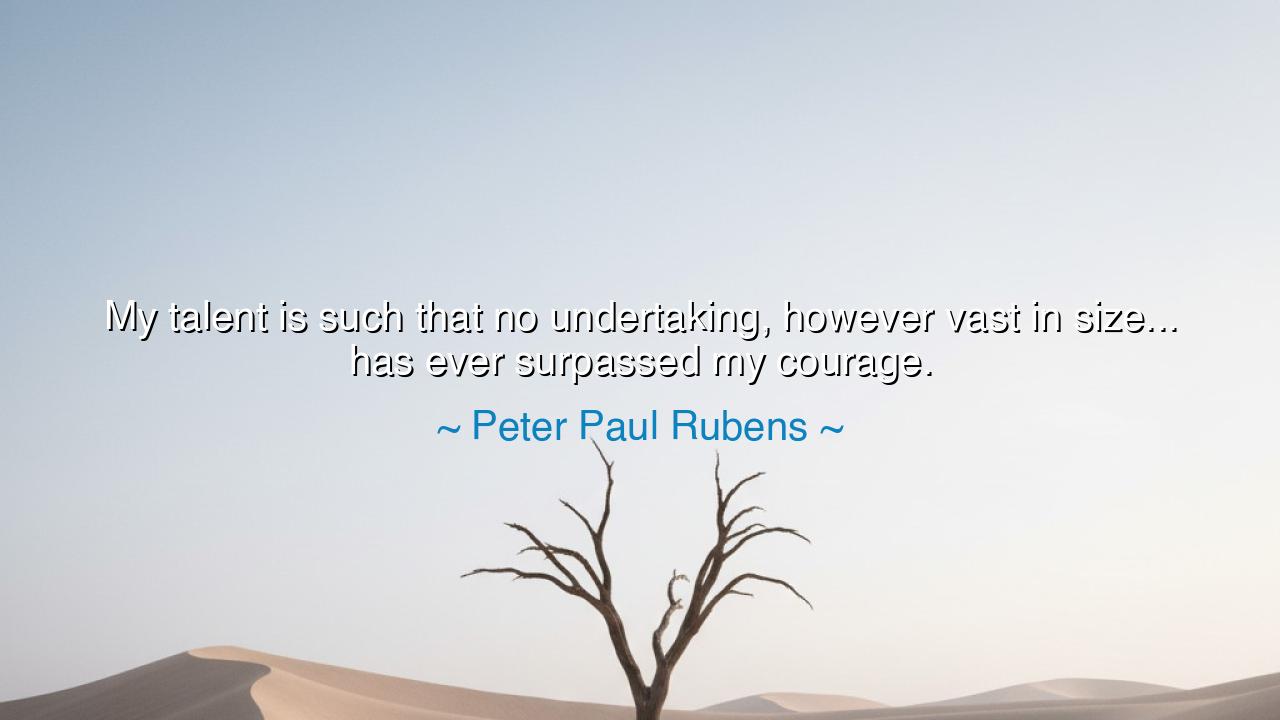
My talent is such that no undertaking, however vast in size...
My talent is such that no undertaking, however vast in size... has ever surpassed my courage.






When Peter Paul Rubens, the great Flemish master of the Baroque age, declared, “My talent is such that no undertaking, however vast in size... has ever surpassed my courage,” he spoke not in arrogance, but in the language of divine confidence — the sacred assurance of a soul that knows its purpose and is unafraid to meet it. In these words, Rubens gives voice to the eternal truth that talent without courage is fruitless, and that true greatness is not measured by skill alone, but by the boldness to act upon it. His art, filled with motion, color, and vitality, was not born of hesitation. It was born of a spirit that dared to attempt the impossible, believing that within human effort burns a spark of the divine.
To understand his meaning, one must remember the world in which Rubens lived — a Europe torn by war, faith, and political unrest, yet aflame with art and discovery. He was not merely a painter but a diplomat, a scholar, a man who walked with kings and spoke the languages of both politics and poetry. He accepted commissions of monumental scale — ceilings that soared above cathedrals, canvases large enough to fill palaces — and yet, as he said, no undertaking surpassed his courage. For Rubens, every brushstroke was an act of faith — a declaration that the human spirit, when united with divine inspiration, could transform chaos into beauty. His words remind us that courage is the soul of creation, the force that turns vision into reality.
There is a rhythm of heroism in this quote, echoing the ancient belief that art and valor spring from the same source. The Greeks called it thymos — the spirited fire within the breast that drives men to noble deeds. Rubens’ confidence was not vanity; it was alignment with purpose. He knew that greatness demands not timid hands, but hearts willing to risk failure in pursuit of glory. His courage was the courage of Michelangelo, who carved David from flawed marble, seeing perfection where others saw ruin; of Leonardo da Vinci, who filled his notebooks with inventions centuries ahead of his time. Such souls do not wait for permission. They trust that the flame within them was placed there by the Creator Himself — and so they act, boldly and without apology.
Consider, for a moment, the story of Christopher Columbus, whose voyage across an unknown ocean changed the course of the world. He was mocked, doubted, and threatened, yet he pressed forward, guided by faith more than by certainty. Like Rubens, he believed that no undertaking could surpass his courage. His talent for navigation would have meant nothing without the will to risk everything upon the open sea. History remembers not those who feared to begin, but those who dared to go beyond the horizon. This is the essence of Rubens’ teaching: that talent must be married to courage if it is to bear fruit worthy of remembrance.
Yet, Rubens’ words hold another layer of wisdom — that courage itself is a form of art. The painter must face the blank canvas; the writer, the empty page; the soul, its unknown destiny. Each must confront doubt, that shadow which whispers, “You are not enough.” But Rubens’ declaration stands as an antidote to that poison. He reminds us that fear is natural, but submission to it is not. Courage is not the absence of fear — it is the mastery of it, the decision to create, to act, to live, even when success is uncertain. In this sense, Rubens speaks for all who labor in faith — not only artists, but anyone who dares to build something beautiful from the chaos of life.
It is important, too, to recognize the humility hidden within Rubens’ boldness. He believed that talent is a divine trust, not a personal possession. His courage, therefore, was not mere self-confidence, but reverence — a determination not to waste the gift he had been given. To claim that no work surpassed his courage was to say that he met every challenge with full devotion, never shrinking from the magnitude of his calling. The true artist, like the true hero, understands that courage is an act of gratitude — the soul’s way of honoring the gifts it has received by using them to their fullest measure.
So, my listener, take this wisdom as your own: do not fear the vastness of your dreams. Whatever your craft, your work, your struggle — remember Rubens’ words. Talent alone is not enough; it must be joined with the courage to begin, to persist, to complete. The world does not reward hesitation, but it honors those who meet their callings with unflinching resolve. When doubt whispers that your undertaking is too great, let your heart answer: “Then it is worthy of me.” For no dream, however vast, can surpass the courage of one who believes in the divine spark within himself.
And thus, as Rubens taught through word and brush alike — to create is to be brave, to live boldly is to honor the gift of life, and to act with courage is to join the lineage of those who have turned the impossible into beauty.






AAdministratorAdministrator
Welcome, honored guests. Please leave a comment, we will respond soon